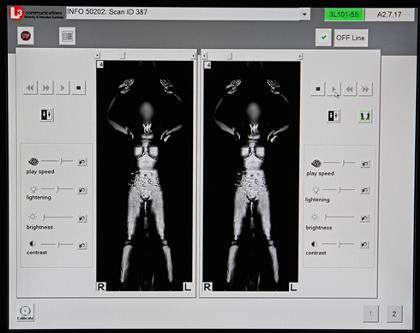Tech site publishes 100 'naked' body scans from Fla. courthouse
Gizmodo obtained the scans through a Freedom of Information Act request. The U.S. Marshals Service admitted in August that it had saved tens of thousands of images of employees and citizens who passed through the courthouse machines.
Here's some of what Gizmodo writes:
We understand that it will be controversial to release these photographs. But identifying features have been eliminated. And fortunately for those who walked through the scanner in Florida last year, this mismanaged machine used the less embarrassing imaging technique.
Yet the leaking of these photographs demonstrates the security limitations of not just this particular machine, but millimeter wave and x-ray backscatter body scanners operated by federal employees in our courthouses and by TSA officers in airports across the country. That we can see these images today almost guarantees that others will be seeing similar images in the future. If you're lucky, it might even be a picture of you or your family.
Federal officials maintain that images recorded with millimeter wave systems (used in the courthouse) and higher-resolution X-ray backscatter technology (used in airports) could not record the images. Here's what the Transportation Security Administration says:
Advanced imaging technology cannot store, print, transmit or save the image, and the image is automatically deleted from the system after it is cleared by the remotely located security officer. Officers evaluating images are not permitted to take cameras, cell phones or photo-enabled devices into the resolution room.
The Electronic Privacy Information Center (EPIC) has filed a lawsuit to halt use body scanners at U.S. airports, arguing that the program is "unlawful, invasive, and ineffective."
In related news, the TSA is investigating a San Diego passenger who has gained notoriety for refusing to undergo a full-body scan, leaving the airport and then publicizing the pat-down he received. John "Don't Touch My Junk" Tyner, 31, may face an $11,000 fine if the agency sues him.
As a protest against the heightened screening procedures, an online campaign is calling for a National Opt-Out Day on Nov. 24, the day before Thanksgiving and one of the busiest travel days.
Yesterday, Homeland Security Secretary Janet Napolitano said her agency has an "open ear" to any "adjustments" to security measures in place at the nation's airports.
Update at 6:56 p.m. ET: A TSA spokesman tells CBS News that airport scanning images cannot be saved.
"The (body image scanning) technology is sent to the airports without the ability to save, transmit or print the images," said spokesman Greg Soule. "At airports, the images are examined by a security officer in a remote location, and, once the image is cleared, they're deleted."
(Posted by Michael Winter)
Copyright © 2010 USA TODAY, a division of Gannett Co. Inc.
